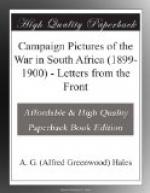General Rundle’s task is a colossal one, and any sane man would think that gigantic efforts would be made to keep him amply supplied with food for his soldiers. But such is not the case. The men are absolutely starving. Many of the infantrymen are so weak that they can barely stagger along under the weight of their soldierly equipment. They are worn to shadows, and move with weary, listless footsteps on the march. People high up in authority may deny this, but he who denies it sullies the truth. This is what the soldiers get to eat, what they have been getting to eat for a long time past, and what they are likely to get for a long time to come, unless England rouses herself, and bites to the bone in regard to the people who are responsible for it.
One pound of raw flour, which the soldiers have to cook after a hard day’s march, is served out to each man every alternate day. The following day he gets one pound of biscuits. In this country there is no fuel excepting a little ox-dung, dried by the sun. If a soldier is lucky enough to pick up a little, he can go to the nearest water, of which there is plenty, mix his cake without yeast or baking-powder, and make some sort of a wretched mouthful. He gets one pound of raw fresh meat daily, which nine times out of ten he cannot cook, and there his supplies end.
What has become of the rations of rum, of sugar, of tea, of cocoa, of groceries generally? Ask at the snug little railway sidings where the goods are stacked—and forgotten. Ask in the big stores in Capetown and other seaport towns. Ask in your own country, where countless thousands of pounds’ worth of foodstuffs lie rotting in the warehouses, bound up and tied down with red tape bandages. Ask—yes, ask; but don’t stop at asking—damn somebody high up in power. Don’t let some wretched underling be made the scapegoat of this criminal state of affairs, for the taint of this shameful thing rests upon you, upon every Briton whose homes, privileges, and prosperity are being safeguarded by these famishing men. The folk in authority will probably tell you that General Rundle and his splendid fellows are so isolated that food cannot be obtained for them. I say that is false, for recently I, in company with another correspondent, left General Rundle’s camp without an escort. We made our way in the saddle, taking our two Cape carts with us, to Winburg railway station; leaving our horseflesh there, we took train for East London. Then back to the




